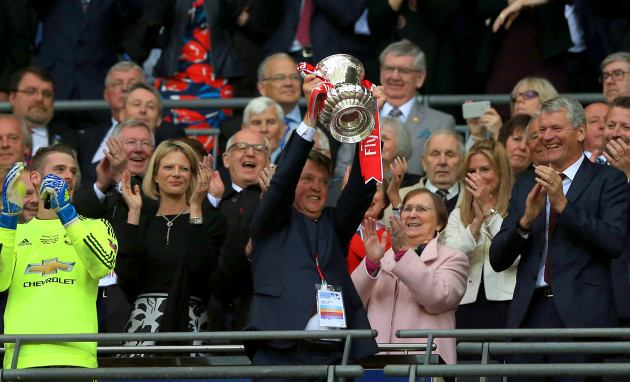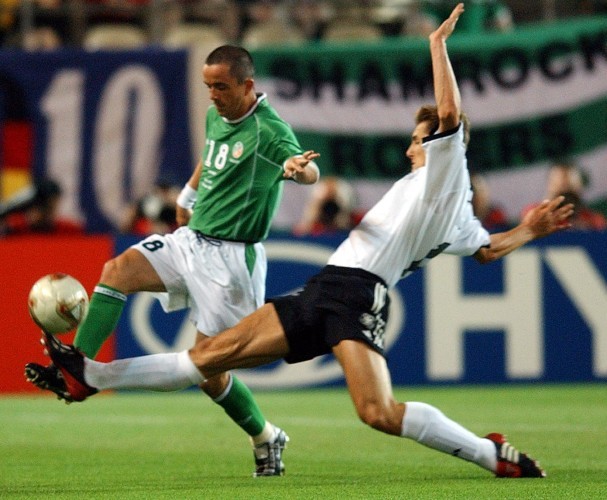“But British players are just as adept at fobbing us off, and here are some classic excuses. The footballer walks past, seemingly talking on his mobile phone. What a shame lads, would love to stop, but just gotta take this call. An England player, who I will not embarrass, was caught out doing this. One of the press pack had his number and dialled it just as he walked by, phone to his ear and apparently talking. What a sweet moment it was when the phone rang.”
– Jonathan Northcroft of The Times provides an enjoyable insight into the workings of the media mixed zone.
“Over the course of a fascinating 90 minutes, Van Gaal, now 67, was his usual charismatic self. He laughed — a lot. When he had a specific point to make he would reach out and give my leg a push, to make sure I was paying attention. If I said something he disagreed with, he would lean back, scoff and dismiss the remark with a wave. Every so often he would finish an answer with a question that demanded a response to the specific point he had made. He asked, more than once, for me to tidy up his sentences because his English ‘is not so good’. He broke off the interview to pose for a photograph with a fan, but not before asking me if it was OK. Van Gaal places huge importance on attention to detail in his personal relationships.”
– After recently confirming his retirement from football management, Louis van Gaal sits down for an interview with the BBC’s Simon Stone.
“I was lured to the Muharraq police station, under the pretence of signing a statement on behalf of my son. When I arrived, the questions began. They forcibly took my phone away from me, threatening to kill my son when I refused to unlock it. They asked me about my relationships with various human rights defenders, activists and opposition groups. They threatened to kill me, they tried to bribe me, they beat me. But worst of all, officers tore off my hijab and attempted to strip me of my clothes, before an officer sexually assaulted me in custody. The pain and humiliation of that week will haunt me for the rest of my life. All this because I took a stand against state repression and the grand prix.”
– Having been imprisoned in 2017 for criticising the Bahrain Grand Prix on Facebook, Najah Yusuf bravely tells her story for The Guardian as she continues to serve a three-year sentence.
“When Mandy was being treated we were pushed towards a centre in Dublin and it was one of the most horrific experiences of our life. We were put into a room with four people who were terminally ill. Mandy was a young woman who, at first, we thought was going to get better and she had so much hope for the future. She cried all the way home in the car. This place is a reaction to how bad that experience was.”
– Former Ireland international Gary Kelly speaks to Rob Bagchi of the Daily Telegraph about his Cancer Support Centre in Drogheda.
“But at Somerton Park the referee, AH Blythe, examined the pitch and announced the game could be played. And played it was, if mainly by Newport. By the 70th minute the home side led 5-1, the visitors battered by the wind and beaten by their opponents. On a muddy and sodden pitch the leather ball became increasingly heavy, and conditions never eased. Foulkes, Norwich’s centre-half, went to head a speeding ball and was knocked unconscious, eventually being carried off the pitch, and a few moments later the referee decided to call the game off.”
– The Guardian’s Simon Burnton tells the story of referee AH Blythe, who infuriated Newport fans in 1951 by abandoning a game at 5-1, before escaping in a police car disguised as an ambulanceman.
“Ricketts lasted only a few months in Bangladesh before returning to England, where he played out the final few weeks of his career at non-league Leatherhead. By the time he hung up his boots in December 2016, he had played for 18 different clubs spread across 11 countries and four continents. Like all journeymen, Ricketts did not set out with the ambition of playing for as many clubs as possible. The hope, with each club he joined, was to find a little bit of stability, a little bit of security, only for circumstances — injuries, managerial changes, financial constraints — to shunt his footballing destiny on to a different set of rails.”
– For Bleacher Report, Tom Williams examines what it takes ‘to become a journeyman footballer’.
“No player in the 27-year history of the Premier League has been as misunderstood as Dimitar Berbatov, both on the terraces and in the dressing room. Some thought he was aloof. Others thought he was arrogant. But at least everybody could appreciate his class: the goals, the vision and one of the finest first touches we have ever seen, the ball never far away from sticking meticulously to his blue-tac blob of a right boot.”
– As part of The Independent’s 100 Greatest Premier League Players series, Luke Brown writes about the enigmatic Dimitar Berbatov.
Subscribe to our new podcast, The42 Rugby Weekly, here:



